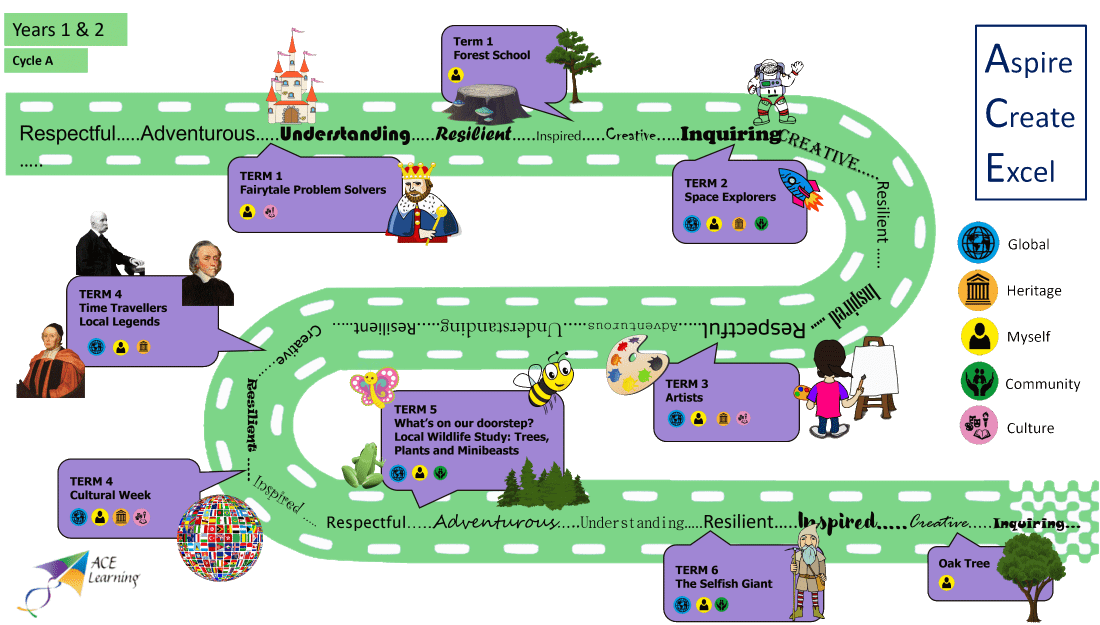Implementation
We have a two year rolling cycle:
2023 – 2024 Cycle A
2024 – 2025 Cycle B
Cycle A
Science Focus
PSHE Key Question

Cycle B
Science Focus
PSHE Key Question

Early Years Foundation Stage
At ACE Learning, we believe that every child deserves the best possible start in life and to provide the environment that enables them to fulfil their potential. Our EYFS curriculum ensures that children learn and develop well and are kept healthy and safe.
We ensure children are ready for their next stage in learning by giving them a broad range of knowledge and skills that provide the foundation for future progress through school and life. At this early stage, ACE Learning values and threads are introduced in to all aspects of school life. Each theme is carefully linked to the seven different areas of learning and development in the EYFS.
Play-based activities are at the heart of learning in the Foundation Stage. As curriculum guidance for the Foundation Stage states:
‘Learning for young children is a rewarding and enjoyable experience in which they explore, investigate, discover, create, practice, rehearse, repeat, revise and consolidate their developing knowledge, skills, understanding and attitudes. During the Foundation Stage many of these aspects of learning are brought together effectively through play and talking’.
We believe that well-planned play within an enriching and stimulating continuous provision is the key to how young children learn. Providing children with opportunities to take part in a variety of play-based activities, challenging their thinking and curiosity is at the core of our teaching. Our aim is to enrich the children’s learning and executive function abilities enabling them to hold information in mind, focus their attention, regulate their behaviour and plan what to do next, ensuring they are fully prepared and able to explore all the new learning and experiences available to them.
The curriculum is planned to provide a balance between the following:
Child Initiated Activities: where the child makes choices from within the learning environment to meet his/her own outcomes for learning. Skillful adult interaction supports, scaffolds, and extends play to enable the child to make progress and think critically.
Adult Initiated Activities: experiences where the practitioner provides the resources to stimulate and consolidate learning. These experiences may not always require the direct involvement of an adult but are invitations and provocations to learn and explore.
Adult Directed Activities: experiences which are planned and supported by practitioners and which aim to meet specific learning outcomes.
The children are very much part of the Foundation team and will work with all staff and children throughout the school week. Children are encouraged to be independent, critical thinkers and keen explorers from a young age in order to promote a desire to learn through self-discovery and adult led learning experiences. The children are continuously assessed against the Early Learning Goals through the year gathered via observation, discussion, parent and child voice, and children’s work. This is very much a school, child, home partnership and you will be actively encouraged to be a part of your child’s learning experiences.
We use the phonics programme Read Write Inc (RWI) from the start of Reception.
From their first full week in Foundation, Children begin their reading journey using the Read Write Inc (RWI) phonics programme. All children are placed into homogenous reading ability groups and are assessed regularly to ensure that they are making the required progress and staying on track.
The first 20 minutes of Read Write Inc each day is referred to as the ‘Speed Sound lesson’ during which children learn a new sound, review sounds that they have been taught previously, spell words and practise reading pseudo (alien) words in order to strengthen their blending skills and prepare them for the Phonics Screening Check.
The remainder of the lesson is spent reading a text and completing comprehension and writing activities which relate to it. The texts are a mixture of fiction and non-fiction and are all completely decodable according to each child’s most recent assessment. Depending on their group level children are working from either a 3 or 5 day timetable. The repetitive nature of the programme is a real strength as children soon become familiar with the routines and expectations of each lesson which maximises learning time. This supports all children with transition between groups but especially those children who may be more sensitive to change.
Any children not making progress are identified very quickly and will be flagged to their class teachers as requiring additional support or intervention. Children who need to learn additional sounds may take part in ‘pinny time’ sessions where they will regularly review sounds and learn new ones informally with an adult at some other time throughout the day.
Each term a topic is chosen which reflects the children’s interests (see roadmap below). A balance of adult initiated and adult directed activities are linked to these themes. A long-term plan has been drawn up to consider the continuous provision within the environment (indoors and outside), the routine, and the topic related activities. Each medium-term plan covers one topic and is separated into the seven areas of learning within the Foundation Stage. This specifies the Early Learning Goal targets for learning, activities, resources, key vocabulary and assessment opportunities. This has been designed to be a working document and evaluations made at the end of each block of work may result in plans being updated or modified to reflect the needs of the children.
EYFS Road Map
Please click or tap the plus signs to find out more about each term:

Year 1 & 2 Road Map
Please click or tap the plus signs to find out more about each term:


Year 3 & 4 Road Map
Please click or tap the plus signs to find out more about each term:


Year 5 & 6 Road Map
Please click or tap the plus signs to find out more about each term:


